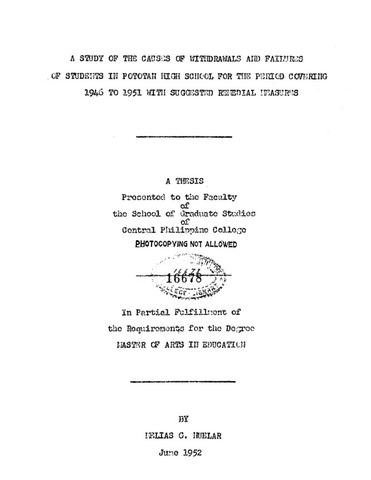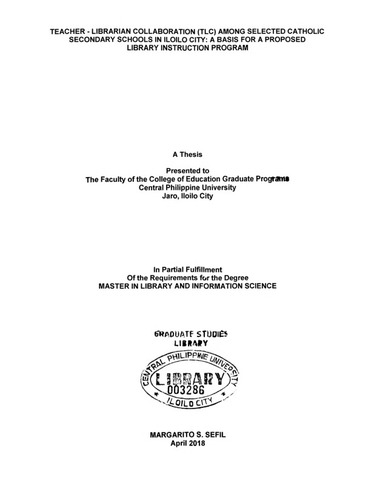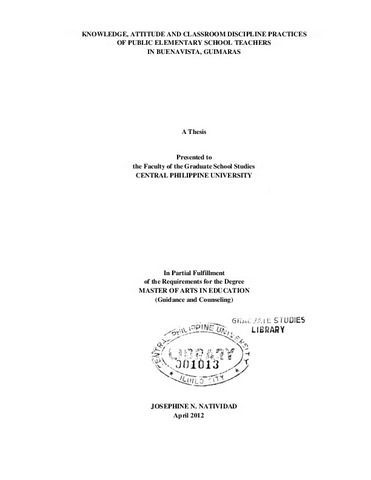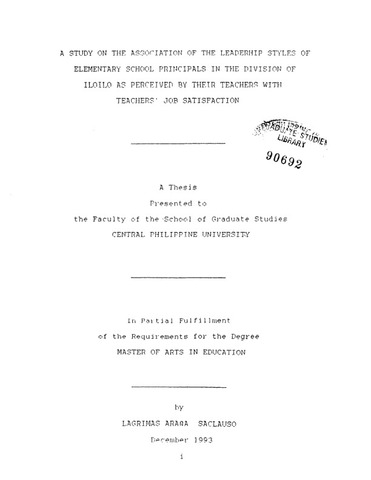A study of the causes of withdrawals and failures of students in Pototan High School for the period covering 1946 to 1951 with suggested remedial measures
| dc.contributor.adviser | Nelson, Linnea A. | |
| dc.contributor.author | Huelar, Melias G. | |
| dc.coverage.spatial | Pototan | en_US |
| dc.date.accessioned | 2022-03-21T02:31:59Z | |
| dc.date.available | 2022-03-21T02:31:59Z | |
| dc.date.issued | 1952 | |
| dc.identifier.citation | Huelar, M. G. (1952). A study of the causes of withdrawals and failures of students in Pototan High School for the period covering 1946 to 1951 with suggested remedial measures (Unpublished Master’s thesis). Central Philippine University, Jaro, Iloilo City. | en_US |
| dc.identifier.uri | https://hdl.handle.net/20.500.12852/1993 | |
| dc.description | Introduction | en_US |
| dc.description.abstract | Since the start of the organized system of education in the Philippines, millions of pesos have been spent every year for the uplift and enlightenment of our people, especially the youth of the land. Even after fifty-three years of American tutelage and guidance our country is still about fifty per cent illiterate. Since then, there is an enormous wastage of school funds; there is a tremendous wastage of time; there is a parallel wastage of human energy. The long entrenched bigotry and narrow mindedness are still deeply rooted in the hearts of many of our people and colonial mentality still persists. What are the causes of all these things? Our leaders through our constitution had made implicit the aims of an education suited to our needs, culture, and temperament. They had the noble purpose of building a strong and prosperous nation by utilizing both its human and natural resources. They had a living vision of making every Filipino citizen a useful, well-rounded individual, possessed with an integrated personality. The foundation of these aims can not bo doubted; it is in their execution that we find stumbling blocks. Because of this our government is wasting money, time, and effort and our people suffer. Education is indeed one of the greatest hopes in guiding our bewildered people through the uncertainties of social change. To be effective that education must meet the demands and challenge of the time. To be functional, that education must not only get interested in classroom activities and not only prepare the children for the future, but should equip the child to live his life today in the changing world in which he finds himself. The utter futility of teaching the child to prepare himself for the future is made potent by the fact that at the rate that social changes are taking place around us, no one knows just what of that we teach him now will indeed be of use to him in the uncertain future. The best that we can do is to equip him to live his life today, to solve his problem today, to think of the solutions of his perplexities today. Those experiences are strong educational foundations that will guide him to meet the future and face the problems that come with it. However, in our effort to educate the child to be a well-rounded individual sufficient to meet the problems in life that may come in his way, it is not enough that we concentrate all our efforts on the child alone. We must open our eyes to the education of the people who directly or indirectly influence his life. Something must be done to the environment where he resides and the other factors that have important bearing on his growth. It is therefore imperative that educators should go beyond the school, far into the nooks and corners of the community and the people living there, integrating them through their experiences, thus developing a dynamic group action and influencing both in the process of emerging interaction. The child is not the only one educated, but also the members of his immediate family. Whatever the child learns and experiences will be learned and experienced by the members of his family, and whatever is experienced and learned by the members of his family is experienced by him. There is continuous interaction, adjustment and re-adjustment. There is continuous education taking place in the community. The homes become the school and the community becomes a great university, and everybody in the home and the community become teacher and pupil, sharing their experiences, skills, knowledge and abilities with one another. One of the perplexing problems in education is withdrawals and failures. A high percentage of students in the public or private elementary and secondary schools withdraw before the termination of the school year. Many fail in most of the subjects taught. When students fail or withdraw from schools, the educational chain that ties every home in the community to the school is weakened. It is therefore imperative that a thorough study of this problem be undertaken and proper remedial measures given for its solution. This thesis is a study of the causes of withdrawals and failures, covering five and one half years of school life and activities of Pototan High School from the year 1946 to 1951 and including the first semester of the school year 1951-1952, with the idea of suggesting remedial measures that might prevent and correct further leakage. The causes of withdrawals and failures in other high schools nay be similar or may vary slightly from that of Pototan High School, so that whatever remedial measures arc suggested may apply to the same of similar problems existing in those high schools. To secure information and data for this study, the following documentary sources were used: the school records from 1946 through the first semester of the school year 1951-1952; the provincial and municipal agencies; the branch of the United States Information Library in Pototan and the local newspaper. Data and information taken from these sources were supplemented by interviews with the students and their parents and also with local officials and leaders of the community. AH school records from the time the Pototan High School started are kept in the office of the principal. Records of the provincial and municipal agencies are also kept in their own offices. | en_US |
| dc.format.extent | 165 leaves | en_US |
| dc.language.iso | en | en_US |
| dc.subject.ddc | GSL Theses 378.242 H87 | en_US |
| dc.subject.lcsh | High school students | en_US |
| dc.subject.lcsh | High school students--Social conditions | en_US |
| dc.subject.lcsh | Grading and marking (Students) | en_US |
| dc.subject.lcsh | Philippines--Iloilo--Pototan | en_US |
| dc.subject.lcsh | School failure | en_US |
| dc.subject.lcsh | Remedial teaching | en_US |
| dc.title | A study of the causes of withdrawals and failures of students in Pototan High School for the period covering 1946 to 1951 with suggested remedial measures | en_US |
| dc.type | Thesis | en_US |
| dcterms.accessRights | Not publicly accessible | en_US |
| dc.description.bibliographicalreferences | Includes bibliographical references | en_US |
| dc.contributor.chair | Nelson, Linnea A. | |
| dc.contributor.committeemember | Forbes, Joseph Morris | |
| dc.contributor.committeemember | Catedral, Alfredo P. | |
| dc.contributor.committeemember | Drilon, Rex D. | |
| dc.contributor.department | School of Graduate Studies | en_US |
| dc.description.degree | Master of Arts in Education | en_US |
| local.subject | Pototan High School | en_US |





